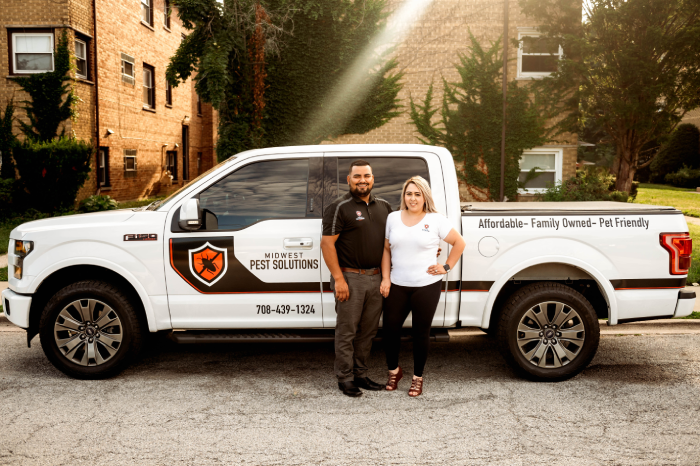Ant Control
Getting rid of ants in Chicago, IL is no easy task. Ants are social insects that live in colonies, which means you must fully eliminate them to avoid another infestation down the road.
Are you dealing with a pest problem in Northbrook? Get the instant relief you need and the long-term protection you deserve! To get started, request a quote online.
|
|
Protecting Northbrook’s homes and businesses since 2018 with safe, effective pest elimination
Northbrook, an affluent north shore suburb of Chicago, is home to over 33,000 residents who enjoy tree-lined streets, top-rated schools, and exceptional quality of life. Located just 25 miles north of downtown Chicago, this prestigious village offers the perfect balance of suburban tranquility and urban accessibility. From the charming downtown area along Shermer Road to the upscale residential neighborhoods near the Chicago Botanic Garden, Northbrook represents some of the North Shore’s finest living. But the same features that make Northbrook so desirable—mature estates with extensive landscaping, proximity to forest preserves and the Chicago River, wooded ravines, and luxury homes with complex architecture—also create significant pest control challenges.
At Midwest Pest Solutions, we’ve spent 7 years protecting Northbrook’s prestigious properties from the pest pressures common to this affluent community. Whether you’re dealing with carpenter ants threatening your estate’s mature trees, mice entering your Techny Road home, termites silently damaging your property’s value, or wasps nesting in your well-landscaped yard, our licensed technicians understand Northbrook’s unique pest ecology and deliver the discreet, professional service that matches the community’s standards.
📞 Call 708-439-1324 for same-day service
Northbrook’s character as an established, affluent suburban community creates distinct pest control challenges:
Northbrook’s homes, many situated on large lots with mature trees and professional landscaping, create ideal conditions for pests:
Northbrook’s location amplifies pest pressure:
Northbrook’s upscale homes present unique pest control challenges:
Northbrook residents expect:
Northbrook’s business district and institutions require specialized approaches:
Northbrook’s pest challenges stem from its unique characteristics as an affluent, wooded North Shore community:
Northbrook is essentially a residential community carved into natural areas:
Unlike typical suburban homes, Northbrook properties often feature:
Professional service ensures complete coverage that DIY efforts cannot match.
Northbrook real estate values demand:
Northbrook homeowners invest heavily in landscaping:
Northbrook residents value:
Based on thousands of service calls throughout Northbrook’s neighborhoods, here are the pests our customers encounter most:
Carpenter ants are the most significant pest threat to Northbrook properties. These large black ants nest in mature trees, stumps, and wood structures, excavating galleries that can cause serious damage over time. Northbrook’s abundance of mature oak and maple trees provides ideal habitat. Parent colonies in yard trees send satellite colonies into homes, particularly targeting water-damaged wood in bathrooms, kitchens, and around windows.
Signs you have a carpenter ant problem:
Why carpenter ants are so problematic in Northbrook: The village’s mature tree canopy provides ideal nesting habitat. Trees in decline, dead wood in wooded lots, and landscaping features like wooden pergolas and decorative logs all harbor colonies. Moisture from extensive irrigation systems, shaded areas that stay damp, and roof valleys that hold water create secondary nesting sites in structures. Left untreated, carpenter ants can cause thousands in structural damage and significantly impact property values.
House mice are extremely common in Northbrook, entering homes through surprisingly small gaps (as small as a dime). They seek warmth, food, and nesting sites in garages, attics, basements, and wall voids. Northbrook’s large homes with extensive perimeters and multiple entry points are particularly vulnerable. A single female mouse can produce 6-10 litters annually, meaning small problems escalate rapidly.
Signs you have a mouse problem:
Why mice are so problematic in Northbrook: Large homes provide abundant harborage and food sources. Three-car garages with direct home access offer easy entry. Wooded lots adjacent to homes provide natural mouse habitat. Aging weather stripping on large homes with many doors and windows creates numerous entry points. Extensive landscaping near foundations provides cover for mice approaching the house. Winter weather drives mice indoors in large numbers.
Eastern subterranean termites pose a serious threat to Northbrook’s high-value properties. These silent destroyers can cause extensive structural damage before detection. Northbrook’s mature wooded lots, landscape features with wood mulch and timber, and homes with original wood framing create ideal conditions. With property values in the millions, termite protection is essential.
Signs you have a termite problem:
Why termites are so problematic in Northbrook: Many Northbrook homes were built 40-70 years ago when termite prevention wasn’t standard. Mature landscaping with wood mulch near foundations provides termite food sources. Wooded lots with tree stumps and dead wood harbor colonies. Moisture from extensive irrigation, shaded areas, and drainage issues creates ideal conditions. High property values mean termite damage significantly impacts resale and appraisals.
Paper wasps build umbrella-shaped nests under eaves, in attics, on decks, and in landscaping features. Yellow jackets nest underground in yards and landscaping, becoming aggressive when disturbed. Bald-faced hornets construct large, enclosed nests in trees and shrubs. All pose sting risks, particularly dangerous for individuals with allergies. Northbrook’s extensive outdoor living spaces (patios, decks, pools) increase human-wasp contact.
Signs you have a stinging insect problem:
Why stinging insects are so problematic in Northbrook: Mature trees and elaborate landscaping provide abundant nesting sites. Large properties with multiple outdoor living areas increase exposure risk. Wooded lots adjacent to homes bring nests close to activity areas. Landscape lighting attracts insects at night. Extensive eaves and complex roof lines on large homes provide protected nesting locations.
House spiders, cellar spiders, and wolf spiders are common in Northbrook basements, garages, and outdoor structures. Occasionally, brown recluse spiders are found in older structures. While most spiders are harmless and beneficial (controlling other insects), their webs and presence concern residents.
Signs you have a spider problem:
Why spiders are so problematic in Northbrook: Wooded properties provide abundant insect prey attracting spiders. Large basements in older homes offer extensive spider habitat. Window wells common in Northbrook homes become spider traps. Extensive landscaping near foundations brings spiders close to entry points. Outdoor lighting attracts insects that attract spiders.
Beyond carpenter ants, Northbrook properties experience infestations of odorous house ants (seeking sugar and moisture in kitchens), pavement ants (nesting under driveways and patios), and occasionally citronella ants (in crawl spaces and basements, producing a lemon scent when crushed).
Signs you have an ant problem:
Northbrook’s extensive tree cover, numerous water features, and proximity to forest preserves create ideal mosquito habitat. Retention ponds, decorative water features, and shaded landscaping provide breeding sites. Beyond nuisance biting, mosquitoes can transmit West Nile Virus and other diseases.
Signs you have a mosquito problem:
Pet-owning households experience flea infestations that multiply rapidly. Proximity to wooded areas increases wildlife exposure bringing fleas near homes. Fleas bite humans when pet hosts are unavailable.
Signs you have a flea problem:
Boxelder bugs and Asian lady beetles (fall): Congregate on south-facing walls seeking entry to overwinter in attics and wall voids
Earwigs (summer): Congregate in mulch beds and enter homes through foundation gaps
Millipedes and centipedes (spring and fall): Migrate indoors during weather changes, especially in homes near wooded areas
Silverfish (year-round): Damage books, papers, and fabrics in humid basements
Pest damage affecting curb appeal in a high-standards communityuildings to modern commercial spaces, Berwyn’s variety demands tailored pest control strategies for each property type.
Carpenter ant damage to mature specimen trees reduces property aesthetics and tree health
Ant mounds in manicured lawns detract from appearance
Spider webs on premium exterior finishes and landscaping
Wasp nests visible on architectural features


We know how frustrating it is to deal with pests and rodents, so we do our best to treat your home as soon as possible. To get started, call 708-439-1324 or request an instant price online!


We’ll get in touch to confirm your contact information, learn more about your unique situation, and finalize pricing. We’ll then schedule your first service if you agree to move forward with us.


We’ll show up on time and treat your problem right the first time around. This gives you peace of mind knowing your family and pets are protected from unwanted pests and rodents.
Seasonal Pest Prevention Calendar for Northbrook
Primary threats: Termite swarms, carpenter ant colonies expanding, overwintered pests emerging, wasp nests beginning, mosquito breeding starting
Action steps:
Primary threats: Peak carpenter ant activity, mosquitoes breeding and biting, wasp nests at full size, spiders abundant, increased pest activity seeking moisture
Action steps:
Primary threats: Mice seeking winter shelter, spiders moving indoors, overwintering insects (boxelder bugs, Asian lady beetles) clustering, final mosquito activity, wasps becoming aggressive
Action steps:
Primary threats: Mice in heated structures, overwintering insects in attics and walls, continued carpenter ant presence in heated areas, reduced outdoor activity but increased indoor pressure
Action steps:
While professional pest control provides the most effective protection for Northbrook’s high-value properties, these steps help minimize pest attraction and entry:
Foundation and Structure:
Landscaping and Tree Management:
Waste Management:
Kitchen and Food Storage:
Moisture Control (Critical for Northbrook’s Wooded Properties):
General Cleanliness and Organization:
Environmental Control:
Pest Prevention:
Structure and Entry Points:
Storage and Sanitation:
Inspection and Maintenance:
For Properties with Pools:
For Properties with Outdoor Kitchens:
For Properties with Guest Houses or Pool Houses:
For Properties Bordering Forest Preserves:
Be vigilant for wildlife that may bring pests or cause entry points
Maintain clear zone between wild areas and maintained property
Consider additional barrier treatments during peak seasons
Increase inspection frequency


5.0 Star Rating ★★★★★
162+ Reviews


5.0 Star Rating ★★★★★
24+ Reviews


5.0 Star Rating ★★★★★
15+ Reviews
Getting rid of ants in Chicago, IL is no easy task. Ants are social insects that live in colonies, which means you must fully eliminate them to avoid another infestation down the road.
Midwest Pest Solutions, LLC can handle anything from a small office space to a large multi-unit building. We provide our property managers, owners or responsible party with all documentation and sanitation reporting needed.
We know how scary waking up to red welts, rashes, and hives due to bed bug bites can be. So if you’ve spent the last few nights tossing and turning, we can help! You see, bed bugs are troublesome pests.
Bees are important for the environment, but their stings are painful and can be deadly if you’re allergic. Our team will safely remove bee nests from your property and prevent them from settling in the first place.
Moles can cause severe damage to your yard and landscape in Chicago, IL by creating a network of tunnels and mounds in the grass and dirt. Once Midwest Pest Solutions, LLC locates all tunnels, we will take a conventional approach to eradicate the moles by trapping and baiting.
Roaches are nocturnal pests and adept at hiding, which means your roach problem can get out of hand before you know it. Trust the experts at Midwest Pest Solutions, LLC to stop these crawling pests dead in their tracks.
Rodents spread diseases, contaminate food, damage property, and breed quickly. Luckily, the team at Midwest Pest Solutions, LLC can help. With over 8 years of experience, we’re Chicago, IL‘s most dependable rodent control experts.
Keeping Silverfish at bay without the help of a professional is no simple task. If you spot one, it suggests a much greater population already infesting your property. They hide near pipes and wires, tiny cracks and crevices, and blend easily into the carpet. Give us a call to help get rid of your silverfish problem today.
Spiders are skilled predators, using their webs to trap unsuspecting pests. And, while most species are harmless, discovering their webs can be unsettling. To get rid of spiders around your home, give us a call!
If you’ve stumbled upon a hornet, yellow jacket, or paper wasp nest, don’t worry, our team can help! With over 8 years of experience removing wasps nests, we’re Chicago, IL‘s leading provider of wasp control
Termites cause an estimated $5 billion in damages each year. Rather than allowing these wood destroying pests to chew through your home, trust the team at Midwest Pest Solutions, LLC to protect your greatest investment.
We proudly serve all Northbrook neighborhoods and areas:
Residential Neighborhoods:
Commercial Districts:
Property Types We Serve:
Also serving nearby communities: Glenview, Deerfield, Highland Park, Winnetka, Wilmette, Skokie, Glencoe, and all surrounding North Shore communities.
How quickly can you respond to emergencies in Northbrook? We offer same-day service for pest emergencies including carpenter ant damage discovery, wasp nests threatening safety, rodent activity, and other urgent situations. Call before noon for best same-day availability.
Do you provide service appropriate for high-value properties? Absolutely. We specialize in serving Northbrook’s prestigious properties. Our service includes comprehensive inspections, detailed documentation, respect for property and privacy, protection of valuable landscaping, and communication that matches community expectations.
How do I know if I have carpenter ants or termites? Both damage wood but are quite different. Carpenter ants are large black ants visible on surfaces, leave piles of coarse sawdust, and create smooth galleries in wood. Termites produce mud tubes on walls, create finer debris, are rarely seen, and create more irregular damage. Both are serious threats requiring professional inspection for accurate identification.
Why do I have carpenter ants when my house isn’t damaged? Carpenter ants usually start in outdoor parent colonies (trees, stumps, landscape features) and send satellite colonies into structures. They’re attracted to moisture and wood in decline. Many Northbrook properties have parent colonies in yard trees that homeowners don’t realize are infested.
Should I treat my trees for carpenter ants? If trees contain parent colonies actively sending ants into your home, treatment is recommended. However, if trees are significantly damaged or in decline, removal may be the better option. We can assess tree condition and recommend the best approach, and can coordinate with your arborist.
What’s the best termite protection for my Northbrook property? For established homes, we recommend the Trelona ATBS baiting system—professional monitoring stations that eliminate colonies including the queen. For new construction, liquid barriers are ideal. For active infestations requiring immediate action, combination treatment provides fastest results. We’ll recommend the best approach based on your specific situation.
How often should I have termite inspections? We recommend annual inspections for properties with active protection systems. For properties without protection, inspections every 2-3 years are advisable, more frequently for older homes or those with conducive conditions. Always inspect before real estate transactions.
Are treatments safe for my koi pond and water features? Yes. We use special care around water features and can select products that are safe for aquatic life. We protect koi ponds, fountains, and decorative water features during application. Always inform us of any water features before service.
Will treatments harm my valuable landscaping? No. We take special care to protect your landscape investment. We avoid direct application to valuable plantings, use products that won’t harm plants when applied properly, and can work around sensitive areas. Your landscape is safe in our care.
Can you provide service without anyone being home? Yes. Many Northbrook clients prefer this for privacy and convenience. We can work with lockbox access, gate codes, and other arrangements. We’ll document service with photos and reports sent via email.
How do mice get into my well-maintained home? Mice can squeeze through gaps as small as a dime. Even well-maintained homes have entry points: gaps around utility penetrations, foundation cracks, garage door seals, roof vents, weep holes, and many others. Our exclusion service identifies and seals all entry points specific to your property.
What’s included in rodent exclusion for a large property? We conduct a comprehensive exterior inspection of your entire property perimeter and all structures. We identify and seal all potential entry points using appropriate materials (steel wool, copper mesh, foam, hardware cloth, metal flashing, concrete). We also address attached structures (garages, pool houses, etc.) and provide recommendations for ongoing prevention.
Do you offer eco-friendly pest control? Yes. We offer comprehensive programs using botanical insecticides, reduced-risk products, mechanical methods, exclusion, and other environmentally conscious approaches. These are effective while minimizing environmental impact—important for Northbrook’s environmentally aware residents.
How often should I have pest control service? For Northbrook properties, we strongly recommend quarterly service. Proximity to forest preserves, wooded properties, and mature landscaping create constant pest pressure year-round. Quarterly treatments provide seasonal coverage for different pest threats: carpenter ants and termites in spring, mosquitoes and wasps in summer, rodent prevention in fall, monitoring in winter.
What if I see pests after treatment? Some pest activity immediately after treatment is normal (insects flushed from hiding). If activity continues beyond the expected timeline, contact us immediately. We’ll return for free re-treatment under our service guarantee.
Can you coordinate with my property manager or landscape service? Absolutely. We regularly coordinate with property managers, landscape services, and other property professionals. We can work around scheduled landscape maintenance, pool service, and other activities.
Do you provide documentation for real estate transactions? Yes. We provide comprehensive termite inspections and reports meeting requirements for real estate closings. We can work within transaction timelines and provide documentation in the format required by lenders and title companies.
Are you licensed and insured? Yes. We hold an Illinois Structural Pest Control License, carry comprehensive liability insurance and workers compensation coverage. All technicians are licensed, trained, background-checked, and professional.
How long does treatment take for a typical Northbrook property? Treatment times vary significantly based on property size and complexity. Average Northbrook homes require 60-120 minutes for comprehensive service. Large estate properties may require 2-4 hours. Rodent exclusion can take 3-6 hours depending on property perimeter. We provide time estimates during inspection.
Can I get a quote without an inspection? We can provide general information by phone, but accurate quotes require in-person inspection. Every Northbrook property is unique in size, pest pressure, landscaping complexity, and treatment needs. We provide free, comprehensive inspections with written estimates before any work begins.
What forms of payment do you accept? We accept all major credit cards, checks, and electronic payments. We also offer financing options for larger projects like comprehensive termite protection or extensive rodent exclusion work.
Midwest Pest Solutions has been protecting northwest and north shore suburban homes and businesses since 2018. Founded by Diana & Jhovany Gaytan, 15-year veterans of the pest control industry, we’ve built our reputation on technical expertise, honest service, and genuine commitment to the communities we serve.
Having treated hundreds of Northbrook properties, we understand this community’s unique characteristics: the pest pressure from adjacent forest preserves, how mature wooded properties affect pest populations, the specific challenges of high-value estate homes, and what it takes to provide service matching the community’s standards.
We understand that Northbrook residents expect more than basic pest control—they expect knowledgeable professionals who respect their property, protect their landscape investment, communicate clearly, and deliver results without shortcuts. That’s exactly what we provide.
We believe in education over pressure. We take time to thoroughly inspect your property, explain what we’re finding, why you have the pest issue, what we recommend, and what results to expect. We use Integrated Pest Management principles combining the most effective treatment methods with prevention strategies for lasting results.
We respect your property as if it were our own. We protect your landscaping, work carefully around valuable features, and leave your property exactly as we found it—except without pests.
When you choose Midwest Pest Solutions, you’re partnering with professionals who genuinely care about protecting your home, your family, and your property investment. We’re not just eliminating pests—we’re providing peace of mind and protecting one of your most valuable assets.
We’re local. We’re experienced. We’re here to help.
Don’t let pests compromise your family’s health, your property’s value, or your peace of mind. Midwest Pest Solutions delivers the expert, discrete, professional pest control that Northbrook residents trust.
📞 Call 708-439-1324 now for same-day service
🌐 Book your free inspection online—get scheduled in 60 seconds
📧 Email: dianag@midwestpestsolutionsllc.com
📍 Serving Northbrook, IL and all surrounding North Shore and northwest suburbs
Hours:
Office Location: 16408 Lawndale Ave, Markham, IL 60428
Here at Midwest Pest Solutions, LLC, we do our best to show up on time, treat your home with respect, and get rid of your pest or rodent problem right the first time around. So in the unlikely event you’re not satisfied with your most recent service, simply give us a call. We’ll come back and retreat your home at no additional cost to you, we 100% guarantee it!


Mention coupon to redeem.
CALL TO CLAIM Or dial 708-439-1324Copyright © Midwest Pest Solutions, LLC 2026. All Rights Reserved. Made with ❤ by GorillaDesk.
Made with ❤ by GorillaDesk